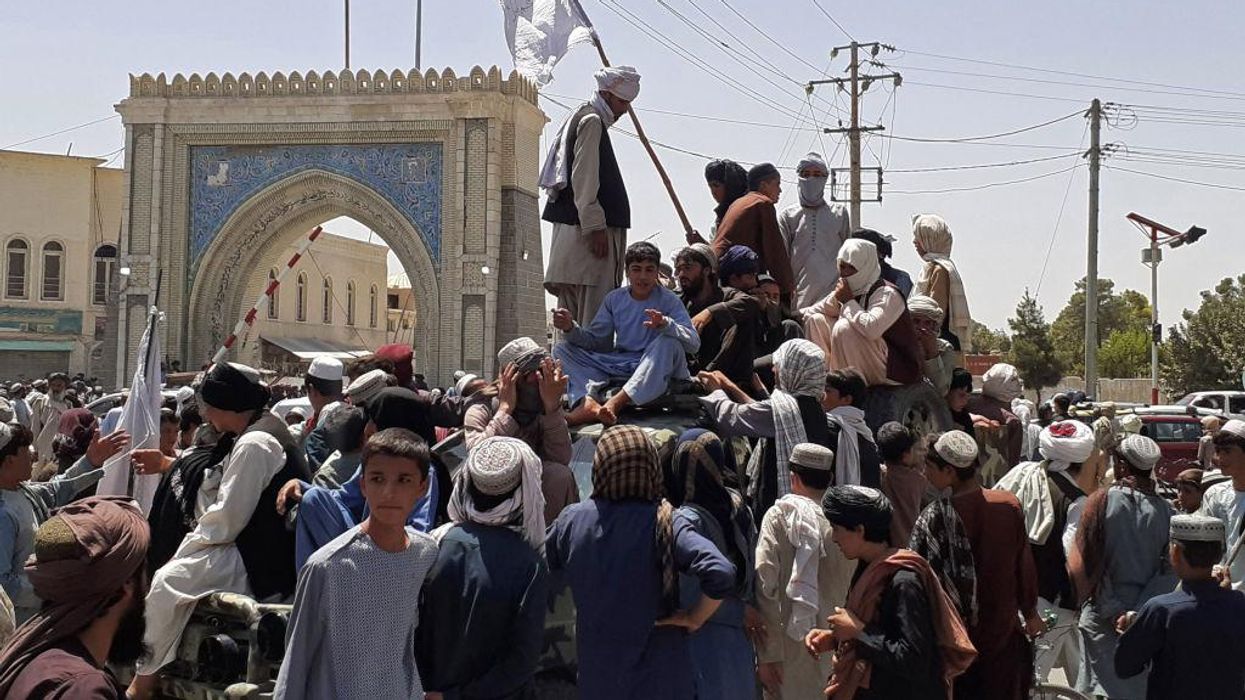
AFP via Getty Images

The Taliban "massacred" and viciously tortured several members of the Hazara ethnic minority in Afghanistan, according to the human rights group Amnesty International.
Amnesty International reported Thursday that nine Hazara men were murdered between July 4-6 in the Malistan district in the eastern Ghazni province.
"Six of the men were shot and three were tortured to death, including one man who was strangled with his own scarf and had his arm muscles sliced off," the report said.
The villagers saw that the fighting between Afghan government forces and the Taliban intensified on July 3. They allegedly fled into the mountains, where they have basic shelters.
However, there was not enough food for the 30 families, so five men and four women returned to the village to gather supplies on the morning of July 4. They returned to their homes, which had been looted by the Taliban, and fighters were reportedly "lying in wait for them."
"One man, 45-year-old Wahed Qaraman, was taken from his home by Taliban fighters who broke his legs and arms, shot him in the right leg, pulled his hair out, and beat his face with a blunt object," the report said.
A 63-year-old man was accused of working for the Afghan government after cash was found in his pocket, then he was severely beaten and "the muscles of his arms had been carved off."
Other Hazara men were "ambushed and executed as they attempted to pass through Mundarakht to reach their homes in the nearby hamlet of Wuli."
An eyewitness told Amnesty International, "We asked the Taliban why they did this, and they told us, 'When it is the time of conflict, everyone dies, it doesn't matter if you have guns or not. It is the time of war.'"
Amnesty's Secretary-General Agnès Callamard said, "The cold-blooded brutality of these killings is a reminder of the Taliban's past record, and a horrifying indicator of what Taliban rule may bring."
Brian Castner, who is Amnesty International's senior crisis adviser for arms and military operations, said the attack happened in the tiny village of Mundarakht that only has 40 men in total living there, nine of which were brutally murdered by the Taliban. Castner adds that the Taliban cut cellphone service to hamper communication of the atrocity.
Taliban 'tortured and massacred' men from Hazara minority in Afghanistan - BBC Newswww.youtube.com
As the Taliban were taking over Afghanistan this week, they reportedly pledged to provide a general "amnesty" for all in Afghanistan, including those who worked with the previous Afghan government. The Taliban also promised a new era of peace in the country. However, many are skeptical of the radical Islamist group's promises, especially the Hazara community.
A few days after capturing Kabul, the Taliban destroyed a statue of Hazara leader Abdul Ali Mazari, who fought against the Taliban until he was executed by the group in 1995.
So Taliban have blown up slain #Hazara leader Abdul Ali Mazari\u2019s statue in Bamiyan. Last time they executed him, blew up the giant statues of Buddha and all historical and archeological sites.\n\nToo much of \u2018general amnesty\u2019.pic.twitter.com/iC4hUZFqnG— Saleem Javed (@Saleem Javed) 1629226488
The Hazara, who make up 9% of Afghanistan's 38 million population, have been previously persecuted by the Taliban. In August 1998, the Taliban went on an alleged "killing frenzy" after conquering the city of Mazar-i Sharif in northwest Afghanistan.
A Human Rights Watch report from 1998 stated, "Within the first few hours of seizing control of the city, Taliban troops killed scores of civilians in indiscriminate attacks, shooting noncombatants and suspected combatants alike in residential areas, city street sand markets."
"In the days that followed, Taliban forces carried out a systematic search for male members of the ethnic Hazara, Tajik, and Uzbek communities in the city," the report said of the 1998 massacre. "The Hazaras, a Persian-speaking Shi'a ethnic group, were particularly targeted, in part because of their religious identity. During the house-to-house searches, scores and perhaps hundreds of Hazara men and boys were summarily executed, apparently to ensure that they would be unable to mount any resistance to the Taliban."
Many Hazaras have adopted liberal values over the past two decades with the Taliban out of power, and now fear the situation could be even worse than before.
"The threat we face now is much more serious than the 1990s," a Hazara woman who works in the government told the New York Times. "I am worried about my life and my family's life.
"Hazara women have a strong presence in the society: They are university students, working outside, and are visible in the streets," she added. "And this is exactly the opposite of what the Taliban want."